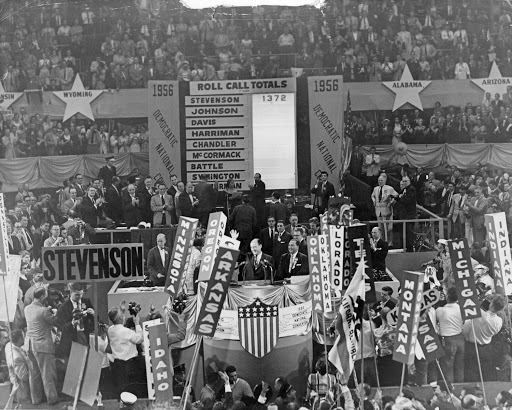 |
| Adlai Stevenson and Richard J. Daley at the podium for the 1956 Democratic convention, via Chicago Collections. |
Covid-19 is a pretty terrible thing, but after a couple of hours of this year's Democratic convention I would like to praise it for one thing: dealing a deathblow to the post-1972 institution of the overstuffed, overblown, visually dead and dead boring political TV convention, with its vast convergence of people to whom favors were owed and every conceivable tendency and intersection lumbering on and off the stage creating hours of virtually dead air and opportunities for the stupidest TV pandits to argue about who "won", generally invidiously and in favor of the speakers offering the least content.
I was watching on MSNBC, which took a pretty reverent approach, with just one break (I think during an unexcited performance by a peculiar couple, the Broadway star Billy Porter and the old-line Laurel Canyon rocker Stephen Stills, who gave a heartwarming interview to Variety if you're interested, but whose contribution was leaving me unmoved, don't @ me), without commercials, and I don't know if other venues gave it the same courtesy, but I was just transported much of the time, and I hate to say it because it might sound cynical, but I believe the production values had a lot to do with that.
Because the demands of the pandemic preventing it from taking place in a single location forced a level of planning such as doesn't normally go into these productions. It was practically edited in advance of the performance, and the care, far from harming the spontaneity of the occasion, brought it to emotional life, from the passionate start of a song written for the occasion by Bruce Springsteen (when I recognized his voice is when I started telling myself, "This is going to be all right"). Which was real, that's why I don't think I'm being cynical in bringing it up.
This was especially true in the ordinary-Americans segments, filled in their own chosen locations and stripped down to the essential moments of 30 seconds or so, so that their stories were as pointed as they could be and the complexity of their representation (great choice was a cop who was a DACA recipient so that he represented both the unheralded good apples of the police force and the loyalty of the baby immigrants at the same time) was really brought out instead of getting drowned in bumbling stagecraft. Their vitally important stories, normally buried in pandit comment and ads, stood out with extraordinary power, and their mere presence in the Zoom shots—young people singing the national anthem, or audiences applauding the major speakers in lieu of the interminable floor demonstrations, ill-made for TV, that replaced the old-time excitement, not for TV, from a time when you didn't necessarily know who the nominee was going to be.
 |
| A not entirely expected movement to nominate Senator John Kennedy for the vice presidency in 1956, via Politico. |
If you were shocked, shocked to find there was propaganda going on in this club, then you may not have understood that there's a place for propaganda in politics. But it's not fascistic, because of the emphasis on plurality rather than uniformity—instead of the unrelenting repetition of a single theme, it's a spectacle of extraordinary variety, full of glitches, too, people getting pixellated and vanishing, simple folk hamming it up at the wrong moments or freezing in the lights, but none of them lasting long enough to do anything but maintain the sense of good humor and ordinariness.
Even the Republicans culminating in a mercifully short glimpse of former Ohio governor (and last standing Trump opponent in the 2016 Republican primary) John Kasich didn't disappoint. They talked about Joe's character and not about their hopes that the candidate might pander to their winger desires. Kasich, posed at a dirt crossroad in some Ohio field, really made his vote sound like a moral choice between good and partisanship, knowing that he wouldn't get what he wanted politically but America would be saved from terrible disaster (well mostly; he didn't make it all the way) by Biden's election, which was the best tone he could have taken. Bernard Sanders, meanwhile, was filmed with a miking that moderated his usual bark and a thoughtful text that was kind of beautiful (couldn't help wishing he'd sounded like that in 2016, but that is what it is) and lit by the same kind of understanding I was talking about in Noam Chomsky and Angela Davis yesterday.
— Yas, Semite! (@Yastreblyansky) August 18, 2020
But the quiet revolutionary message epitomized in Biden's "Build Back Better" slogan (take advantage of the Trumpian destruction to create something quite a lot like a new society) was there in the visuals, not least in the Springsteen video, which is a gorgeous illustration of the general tendency.
Republicans can't do anything like this, because even if they could access the technique they don't have the material.
No comments:
Post a Comment